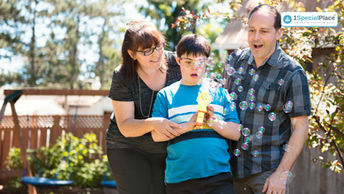All Posts


Autism Series to Support Strategies: Choice Making, Routines, Preparation, and Understanding Stims
Supporting a child with Autism Spectrum Disorder (ASD) requires patience, planning, and an understanding of their unique ways of interacting with the world. From making choices to following routines, managing stims, and preparing for transitions, these strategies build independence, communication skills, and social competence. This comprehensive guide explores effective approaches to help children with ASD thrive in daily life and social situations. The Power of Choice Making
1SpecialPlace
6 min read


Christmas Holiday Activities for Kids at Home
Christmas is a time of joy, togetherness, and celebration—but during times of social distancing, families often look for meaningful Christmas activities for kids at home that are fun, engaging, and developmentally enriching. The good news? Holiday moments can be turned into powerful learning opportunities, especially when activities are thoughtfully planned. From boosting speech and language skills to encouraging creativity, turn-taking, and emotional connection, these holid
1SpecialPlace
4 min read


Building Bonds Beyond Barriers – The Inspiring Journey of Buddy Up Founders, Gopika and Moneisha
In this month’s Success Story segment, we bring you a heartwarming story of friendship, resilience, and purpose. A journey led by two inspiring mothers who turned their personal challenges into a movement that celebrates connection and inclusion. Meet Gopika Kapoor and Moneisha Nagar, co-founders of Buddy Up , a unique social platform designed to help people with disabilities build friendships, communities, and a true sense of belonging. Their story is not just about creatin
1SpecialPlace
7 min read


Swallowing Difficulties: A Comprehensive Guide
Swallowing is a complex process that involves several muscles and nerves working together. Dysphagia , a swallowing condition, can result from a disruption in this mechanism. Dysphagia can be a serious condition, leading to malnutrition, dehydration, and even aspiration pneumonia. Swallowing difficulties, also known as dysphagia, can affect people of all ages for various reasons. This condition may arise from neurological disorders, muscular problems, structural abnormalities
1SpecialPlace
5 min read


Swallowing: The WH’s of Dysphagia
Dysphagia refers to a difficulty in the process of swallowing, where it takes more effort than normal to move food from the mouth to the stomach. Dysphagia can be associated with pain ( odynophagia ) and is common among young babies and older adults. It is a problem with swallowing that makes it difficult to get food or drink from your mouth to your stomach. Dysphagia is a painful condition. Swallowing can be difficult in several instances. Having trouble swallowing on occ
1SpecialPlace
5 min read


Is Stuttering a Disability? Understanding the Facts
Stuttering, often misunderstood as a minor speech hiccup, is actually a complex communication disorder that affects the fluency and rhythm of speech. Characterized by involuntary repetitions, prolongations, or speech blocks, stuttering impacts millions of people across the world both children and adults. While occasional disfluencies like “uh,” “you know,” or “umm” are part of normal speech, frequent and persistent disruptions can indicate stuttering. Beyond speech itself, st
1SpecialPlace
6 min read
